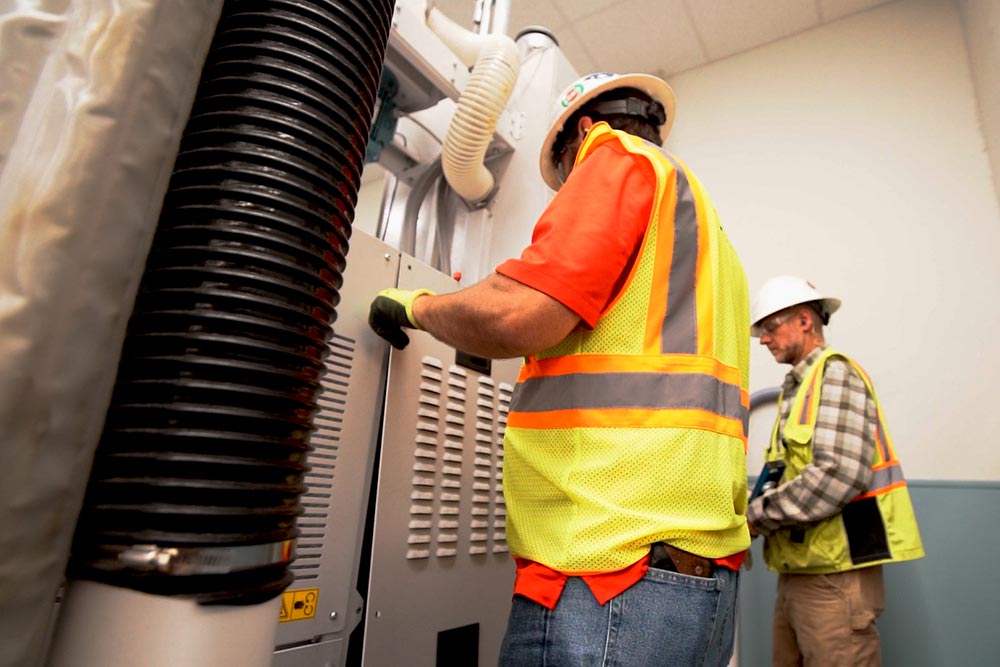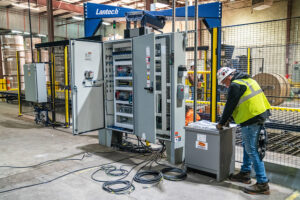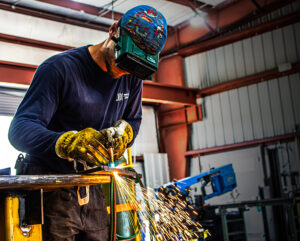Electrical maintenance allows all machinery, equipment, and systems in industrial settings to run safely and efficiently. It involves regular inspections, servicing, repairs, and troubleshooting to prevent breakdowns, reduce downtime, and maintain optimal performance.
The National Construction Center for Education and Research (NCCER) prepares JDI’s team to be able to identify, perform, and solve electrical problems.
It is crucial there is routine maintenance for electrical systems to ensure reliability with electronics and machinery. Preventative and predictive maintenance is put in place to ensure operations, typically by way of upgrades, and set up semi-annual and annual preventative maintenance routines to prevent failure.
Upgrades and modifications often occur in the maintenance of electrical components to ensure the safety and performance of operations. Below are some more examples of how JDI shows the importance of electrical maintenance.
Electrical Maintenance Process
Preventative Maintenance
Preventative maintenance is an initiative-taking approach to maintenance that is put in place to prevent equipment failure and ensure that machinery and systems operate efficiently. There are scheduled inspections and maintenance tasks performed regularly to identify and address potential issues before they lead to equipment failure. Preventative maintenance is a strategic investment that not only safeguards assets but also contributes to the overall reliability, safety, and efficiency of industrial operations.
Corrective Maintenance
Corrective maintenance in the electrical world involves repairing equipment or systems after they have failed or malfunctioned. The repairs and fixes restore functionality and prevent further damage. When equipment fails unexpectedly, quick response is crucial to minimize downtime and production losses. Corrective maintenance is essential for addressing unforeseen failures and maintaining operational continuity.
Electrical Systems Maintenance
Electrical system maintenance is critical for ensuring the safety, reliability, and efficiency of electrical infrastructure within industrial and commercial settings. We at JDI believe in ensuring the safety and functionality of electrical components, circuits, and systems within industrial facilities. By prioritizing regular inspections, preventative measures, and compliance with standards, JDI can minimize risks, optimize performance, and ensure the longevity of our client’s electrical infrastructure.
Mechanical Systems Maintenance
Mechanical Systems Maintenance includes the upkeep and management of various mechanical components and equipment within industrial and commercial settings. Maintenance of mechanical equipment such as pumps, motors, conveyors, and HVAC systems ensure they operate smoothly. Regular inspections, initiative-taking repairs, and compliance with industry standards, allows JDI to optimize equipment reliability, minimize downtime, and ensure safe and efficient operation of mechanical systems without creating electrical failures.
Emergency Maintenance
Emergency maintenance refers to unplanned or urgent repairs and actions taken to address equipment failures, malfunctions, or safety hazards that require immediate attention. Responding to unplanned breakdowns or emergencies promptly to minimize downtime and production losses. By emphasizing preparedness, safety protocols, and effective communication, JDI can lessen risks and optimize their emergency response capabilities.
Compliance and Safety
Compliance and safety are paramount considerations in maintenance practices across all industries. Ensuring that all maintenance activities comply with safety regulations and standards to protect workers and the environment allows our clients to feel safe in their day-to-day ops. JDI’s electrical team prioritizes compliance and safety in our maintenance schedules, so companies not only protect their workers and assets but also enhance operational efficiency, reducing downtime due to accident prevention and maintaining a positive reputation within their industries.
Routine Maintenance
Routine Maintenance refers to regularly scheduled tasks and procedures aimed at preventing equipment failure, optimizing performance, and extending the lifespan of machinery electrical systems, and infrastructure. Having routine maintenance optimizes performance and extends equipment lifespan. Routine electrical maintenance is a proactive approach to managing assets and infrastructure by performing scheduled inspections, cleaning, torque specifications, and parts replacement where and when needed. It plays a crucial role in maintaining reliability, efficiency, safety, and compliance while extending the operational lifespan of equipment and systems.
Upgrades and Modifications
Upgrades and modifications involve planned changes or enhancements made to existing equipment, systems, or facilities with the goal of improving performance, efficiency, reliability, safety, and compliance. Performance improvements, efficiency gains, reliability enhancements, and safety and compliance are all being improved with upgrades and modifications. By upgrading systems like MCC’s, control and panel systems, or just simply upgrading wiring, clients can achieve sustainable improvements in performance, reliability, and safety while optimizing their electrical systems.

Functionality: Why is Electrical Maintenance useful?
By investing in the maintenance of your electrical systems you equally minimize the downtime of your machinery and workforce. Electrical maintenance serves the functions of ensuring the reliability, safety, and efficiency of equipment and systems within various industries.
The result of regular maintenance is that we allow companies to avoid harmful and hazardous situations, meet their compliance needs, and deliver their end-product. By implementing preventative maintenance strategies, ensuring regulatory compliance, and leveraging technology advancements, JDI makes sure that clients can stay deliverable, and safe.
Personnel, Environmental, and Equipment Safety
Safety is paramount in both industrial and electrical maintenance due to several critical reasons. Protection of personnel is safeguarding the health and wellbeing of maintenance and operation personnel who work with potentially hazardous equipment, machinery, and electrical systems.
The protection of equipment and assets from electrical overloads and short-circuits ensures safety during maintenance activities and helps protect valuable equipment, machinery, and infrastructure from damage or premature wear. Safety in industrial and electrical maintenance is essential for protecting personnel, preventing accidents, complying with regulations, minimizing downtime, and maintaining a productive and efficient work environment. JDI’s safety priorities not only ensure legal compliance but also contribute to the overall well-being and success of our clients.
Maintenance and Operation Costs of the Electrical System
Maintaining your electrical system leads to long-term cost reduction, by way of dependable components being installed and checked regularly by dependable electricians. JDI believes in keeping the costs low on the overall lifespan of the facility and its operations by way of electrical maintenance.
We collaborate with clients to come up with the most cost-effective plan, without compromising the intentions of safety and production. This allows clients to feel less burden on their budget, and their employees and machines, which gives them the freedom to continue innovating and delivering without obstacles.
A JDI project manager can be contacted today; we will provide the kind of service you’ve been missing.


